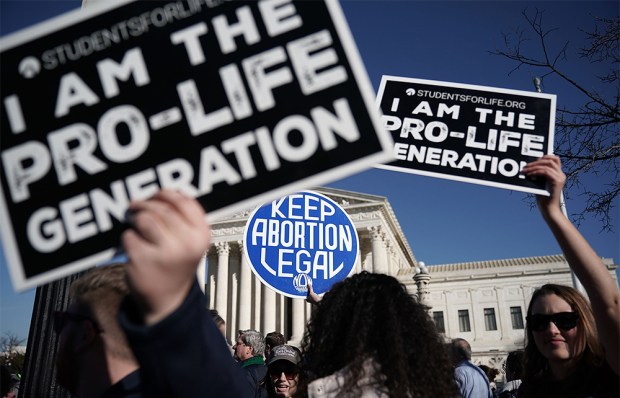Predictably enough, there have been no calls this week for the Irish referendum on abortion to be re-run, no complaint from Ken Clarke about the ‘-tyranny of the majority’, no moaning that the campaign had been in any way unfair. Neither should there have been. The Irish people have made a fair and democratic choice and the result should be respected.
Less respect seems to have been forthcoming, however, for the views of the Northern Irish on abortion. On the contrary, no sooner was the result from south of the border announced than the calls began for the government in Westminster to impose its will on Northern Ireland and liberalise the province’s abortion laws. Shadow attorney general Shami Chakrabarti, playing on Theresa May’s claim to be a feminist, suggested ‘the test of feminists is whether they stick up for all women’ and impose liberal abortion laws on the province. It was a remark which was ignorant as well as intolerant — far from ‘all women’ supporting abortion, polls which have broken down responses according to gender have tended to show that women generally have less favourable views towards liberal abortion policies than men do. A recent ComRes poll, for example, revealed that 60 per cent of the UK population support a reduction in the limit for abortion from 24 weeks to 20 weeks — broken down into 49 per cent of men and 70 per cent of women.
Sir Vince Cable, meanwhile, demanded that the government take advantage of the temporary lack of an assembly at Stormont, saying: ‘The position in Northern Ireland is now highly anomalous and I think probably action will now have to be taken.’ The same argument could be said about the different policies across the United Kingdom on fracking, drink-driving and on many other issues where the Scottish Parliament or Welsh or Northern Irish assemblies have chosen to adopt different polices from those which apply in England. Anomalies are the inevitable and, indeed, intended result of devolution. If it’s done properly, laws are going to end up differing across the United Kingdom. Few campaigners objected when, in 2015, the government announced its intention to devolve abortion laws to the Scottish Parliament, even though it is likely to mean different laws applying in Edinburgh and in London.
Clare Murphy, a director of the British Pregnancy Advisory Service, declared that ‘While the government can say that abortion is a devolved issue, human rights are not.’ In doing so she showed a distinct lack of understanding about human rights and democracy. In 2015 a High Court ruling declared Ulster’s strict abortion laws to be in breach of the mother’s human rights in instances of rape and fatal foetal abnormalities — in other words where there is zero chance of the unborn child surviving. The judge did not, however, seek to overturn Northern Ireland’s laws — the ruling respected the right of the Northern Irish Assembly to decide the issue. It was a judgment which did what many campaigners seem disinclined to do: allow the democratic system to balance the human rights of mother and unborn child.
Many at Westminster will be quite happy to see the focus on abortion debate shifted to Belfast, as it allows them to put off the duty of considering the bioethical issues which medical advance is forcing upon them. The cases of Charlie Gard and Alfie Evans have revealed the passions which can be aroused over whether or not to subject sick children to untested treatments which may be both painful for the child and ruinously expensive for the health service. But they have underlined even more just how inadequate the law is in this area. It is one thing to cut out the parents in cases where they have religious or other objections to potentially lifesaving treatment; quite another when the state steps in to rule that a child should be allowed to die when the parents believe they have identified a possible treatment. Important ethical issues such as these should not be the realm of party managers and whips, but they certainly need to be discussed and the law kept abreast with medical advance.
Westminster is overdue an abortion debate of its own. The Irish referendum paves the way for abortions to be carried out in that country up to a gestation period of 12 weeks. In Britain, we have a limit of twice that, although in practice just 2 per cent of terminations take place at 20 weeks or later. The longer limit seems like the real anomaly. It is bizarre that in the same hospital healthy foetuses of 24 weeks may be terminated, while elsewhere emergency doctors work around the clock to save a premature child of the same age. (Most born at this stage, the so-called micro preemies, now survive.) With the honourable exception of Jeremy Hunt, who has publicly expressed his wish to reduce Britain’s abortion limit to 12 weeks — when nine out of ten terminations take place — no one in government seems prepared to speak out.
The result of the Irish referendum is for some a cause of rejoicing — a triumph of light over darkness. For others it is the other way round. In reality, bioethical issues — on abortion and other things — occupy a vast shady area in between. Neither the Irish referendum nor the campaign to take the battle for abortion rights to Northern Ireland go far towards resolving the ethical conundrums.
Got something to add? Join the discussion and comment below.
Get 10 issues for just $10
Subscribe to The Spectator Australia today for the next 10 magazine issues, plus full online access, for just $10.
You might disagree with half of it, but you’ll enjoy reading all of it. Try your first month for free, then just $2 a week for the remainder of your first year.














Comments
Don't miss out
Join the conversation with other Spectator Australia readers. Subscribe to leave a comment.
SUBSCRIBEAlready a subscriber? Log in